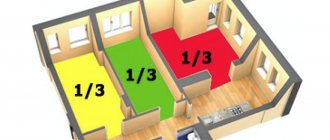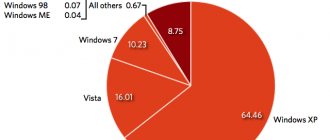How to allocate a room from a share in an apartment
A share in property is not defined as a specific part of the area. Therefore, 1/2 of the apartment does not make the owner the owner of a certain room.
Where to start allocating a share in an apartment? How to allocate a share in an apartment - step-by-step instructions
The desire to turn a share into a room is due to the following reasons:
- the shared owner does not have his own clearly defined territory;
- it is not allowed to split the account to pay for housing and communal services;
- any action (sale, rent, pledge) in shared ownership must be approved by the co-owners.
Transferring a share in an apartment is possible in one of two ways:
- Division of shared ownership by agreement of the owners. This option is allowed only on a voluntary basis of all co-owners.
- The allocation of property by redemption or as an isolated part. To implement this method, you will need to go through the court if at least one of the owners does not agree to allocate the territory on a voluntary basis.
Conditions for transferring a share of an apartment to a room
In practice, transferring a share to an isolated room turns out to be a difficult undertaking. In order for the allocation in kind to become possible, the following conditions and standards must be taken into account:
- The allocated rooms must be completely autonomous and independent from the rest of the apartment, i.e. have separate entrances and communication systems (water supply, gas supply, electricity).
- In fact, the room should be like an “apartment within an apartment” - in this case, no difficulties will arise with its allocation.
- The allocation must be made in an apartment that is not burdened with restrictions, prohibitions, etc. Thus, if the apartment or part of it is pledged to a banking organization, it will simply not be possible to carry out the allocation in kind.
- The allocation should not infringe on the rights and interests of other residents, especially the disabled, minors, incompetent, partially capable or low-income residents.
- Allocating a share to a room should not impede access for other residents to common areas or create situations that are potentially dangerous to life and health. For example, if the allocation of a share requires the mandatory demolition of a load-bearing wall, then no one will ever give consent or permission to carry out such a procedure.
- The very possibility of transferring a share in a room should be discussed with an experienced real estate expert, and any major repairs (either already completed or just planned) should be officially approved by the BTI.
- The allocation must be made in relation to a room that meets modern housing standards. Thus, utility rooms, rooms without windows, etc. are considered unsuitable for living.
- The newly formed room should also not be less than 28 square meters. m. (SNiP 31-01-2003).
During an independent assessment of the premises, it may turn out that allocating a share to an isolated room is impossible due to the technical features of the apartment. In this case, the separating owner may demand payment of monetary compensation corresponding to the value of his share. As a result, the remaining co-owners buy out his share from the allocated owner, and he himself loses all rights to the residential premises.
In addition to full compensation, partial monetary compensation may also be paid. This is practiced if the allocation of shares in kind took place, but due to the technical features of the original apartment, one of the co-owners received insufficient living space.
Example. 2 co-owners decided to divide a 2-room living space between themselves. There were all the conditions for this - separate entrances, independent communication systems, and the absence of restrictive measures. However, the areas of the rooms were unequal (30 sq. m. and 20 sq. m.), while each of the co-owners owned ½ share in the right of common shared ownership. Then the co-owners agreed that the owner who received a larger share would pay partial monetary compensation for the missing meters to the other owner. This fact was reflected in the Agreement on the allocation of shares in kind.
Rights of owners of shared ownership
The legislation determines what exactly the owner can do with his share:
- own;
- dispose of;
- exploit.
The main condition is that the implementation of rights does not affect the interests of other parties. Therefore, the disposal of real estate in shared ownership is possible only with the consent of other shareholders.
Sales and rentals will be possible only with the consent of other shareholders. An exception is donation, which allows you to transfer the area to another person without obtaining consent from the co-owners.
To draw up a will to transfer a share, consent from the co-owners is not required. This rule is based on Article 1119 of the Civil Code of the Russian Federation. If the will does not indicate what share will go to each of the heirs, then the property is divided into equal parts.
Despite the fact that the law does not establish a restriction on the use of a share of an apartment as collateral, banking institutions do not accept such property. The reason is the difficulty of compensating for losses through fractional ownership.
Room or share: what am I selling?
September 21, 2021
This text may be reprinted
subject to the rules
Text of the video “Room or share: what am I selling?”
Hello, the portal forum received a question: “Please tell me!” The court allocated me a room to live in the apartment, and also determined the share of ownership in this apartment. The court also determined the amount of payment for utilities for all residents of the apartment. I'm thinking about selling. What am I selling: a share or a room? As far as I understand, the price difference for these two options will be significant. »
Rooms and shares. How not to get confused? How to understand what a room is, what a share is?
Let's try to figure it out.
There are “ideal” and “real” shares. The ideal share is the share that does not correspond to the area of any of the rooms and is not allocated in any way.
A simple example: Let's say a two-room apartment. One room is 8 meters, the other is 20. The person owns 50%. That is, his share is 50%.
Which room is this share in?
Where is 8 meters? But this is not enough.
Where is 20 meters? But that's a lot.
That is, it turns out that a person has a share in both one and the other room. And how these shares will be distributed among other co-owners is always a subject of agreement.
If we haven’t reached an agreement, that means your neighbor can walk around your room. (Just like you can walk around your neighbor’s room, and no one can stop you from doing so. Why? Because in that room you have your share. And in the room you occupy, there is your neighbor’s share.
This concerns “ideal shares”.
But the shares are real.
Real shares correspond in area to any room, and are allocated in kind in the form of a room. That is, in the title documents it is written that “a person owns room number such and such, which is so many hundredths of an apartment. In this case, the person owns the room, and in this case, he can put a lock on his room and not allow anyone into his room, including other neighbors. But just like neighbors can isolate themselves: they can also put a lock on their room and not let you in either.
The room, of course, costs more than the ideal share. Why? Because a person has his own room, where he can come, and where he can live, and where he does not have to wait for his neighbors to come.
When a person owns a share, then, as I already said, other neighbors can walk along this share at any time of the day or night. This is why rooms cost more than shares. That is, if according to your documents you own a room, rejoice: you can sell this room for more than you would sell your share.
But you need to look at the title documents. That is, it should clearly indicate that you own, say, room number 1, at such-and-such an address in apartment number such-and-such.
Thank you for your attention.
I was with you, Dmitry Ovsyannikov and the project “ipotek.ru, About mortgages in Russian.”
If you have questions about mortgages or real estate, ask them on the portal forums.
Lending center and real estate agency Copper Horseman
Call with any questions!
The difference between an allocated share in an apartment and an unallocated one
When selling/mortgaging a property, it is often found that the property has several owners. Joint ownership of property is not uncommon; one area is often shared by former spouses, residents of communal apartments, heirs who have received ownership of one apartment or house. Each owner has his own share. It’s good if there are friendly relationships between the owners and they are ready to jointly act as borrowers or sellers of the property. But sometimes a situation arises when one of the owners wants to pledge/sell his share, but the other owners are against it. In this article we will tell you what types of shares there are and how to carry out the process of allocating a share.
Types of shared ownership of real estate objects
There are 2 types of shared ownership for real estate:
- An allocated share is a share in kind (in the form of living space, in kind), as a rule, it is one or several separate rooms with a certain order of use. The room belongs entirely to the owner, as a separate piece of real estate. The documentation for the property indicates: footage, rights to use a specific room, room number according to the technical passport (if there is one) Separate utility bills are received for the room. This type of share is easier to sell and is great for a home equity loan.
- Unallocated share - This type of share implies that the shareholder is not assigned a separate room in the home. For example, you own a 1/3 share in a two-room apartment. This type of shared ownership does not allow you to fully manage your property. To sell or receive a loan secured by real estate, you must first carry out the procedure for allocating a share.
When do you have to allocate shares?
The allocation of a share will be required in the following situations:
- owners constantly conflict, for example, in the presence of bad habits or discomfort caused by various means;
- owners are complete strangers who want to own their space regardless of their roommate;
- if you wish to dispose of the area without the need to coordinate actions with other apartment owners;
- if necessary, sell a share.
Types of allocation and documentation
Allocation of a room from a share is possible peacefully or by going to court.
In the first case, each of the co-owners must give their consent to the allocation. A problem may arise when trying to allocate a small room. The court may decide when the remaining shareholders pay the cost that the right to ownership is completely lost.
The legislation establishes that in some cases the owner of the share will not even be required to agree to receive funds for his part of the apartment.
Such a procedure will be based on Article 252 of the Civil Code of the Russian Federation, according to which a minor share can be transferred into the possession of the remaining owners with payment.
The courts do not favor cases of separation of rooms, since this procedure causes the appearance of more communal apartments.
With full agreement
If each of the owners agrees to the allocation, then they must follow the algorithm:
- Draw up an agreement on the allocation of shares.
- The area to be allocated must be prepared correctly. It is necessary to divide the area in accordance with the shares of the shareholders. If redevelopment was carried out, then all changes made must be registered in the BTI.
- If, upon allocation, the area of one of the owners turns out to be less than the share, then the co-owners will have to pay the missing difference. These points must be reflected in the concluded agreement.
- Registration of new areas in Rosreestr.
When going to court
If at least one of the co-owners does not agree to the allocation of a share, then an appeal to the court will be required. The procedure will take place in accordance with the algorithm:
- Receive confirmation of the possibility of allocating a share of the apartment. To draw up this document, you will need to invite specialists from the BTI.
- Submit a statement of claim against each owner. The application must contain complete information regarding the wishes of the shareholder (what kind of real estate the procedure will be carried out, what area exactly needs to be allocated, the size of the shares, and so on). If compensation is required, calculations of the amount are attached.
To file a claim against co-owners for the allocation of an apartment, you must attach the following documents:
- confirmation of ownership;
- certificates from the BTI;
- confirmation of the possibility of allocating a share;
- confirmation of payment of state duty.
Additional documents may also be required, the list of which depends on the need to calculate compensation and other nuances. If the court approves the claim, then the owner of the room will have to go to Rosreestr to register ownership.
Transfer of a share in a room in court
Transfer of a share in a room by court order is possible only after the allocated owner contacts a real estate appraiser. During the examination, the specialist must find out whether it is possible to divide the apartment in kind, how the number of shares relates to the total area of the original property, and what the market value of the residential premises is. All this information will need to be included in the statement of claim.
City (district) courts deal with these cases . The final choice of authority depends on the address at which the disputed property is located. The statement of claim will need to include the following information:
- Full name and address of the court.
- Full name, registration/residence addresses, contact details of the participants in the process (Plaintiff, Defendant, witnesses).
- Cost of the claim (the cost of the Claimant’s share, indicated in rubles).
- Information about the property (address, floor, number of rooms, footage, number and size of shares of all participants in common shared ownership).
- Indication of the type of ownership (shared or joint).
- In accordance with what documents the common ownership was formed (for example, in accordance with a purchase and sale agreement ... share, donation agreement ... share, etc.).
- Grounds for filing a claim (for example, the impossibility of further use of a common property due to one reason or another, the Defendant’s disagreement with the voluntary allocation of a share in the room, etc.).
- Description of pre-trial attempts to resolve the conflict (whether there were any, what they led to).
- Expert assessment on the allocation of a share in kind (whether it is possible, how best to produce it).
- Optionally, calculation of monetary compensation if allocating a share in kind is impossible.
- Plaintiff's request.
- List of attached materials.
- Date of compilation and signature of the Plaintiff.
The statement of claim for the allocation of a share in common property is supplemented by the following set of documents:
- copies of the passports of the Plaintiff and the Defendant (if the case directly affects the interests of a minor - his birth certificate);
- technical passport for the apartment, issued by the BTI;
- extract from the Unified State Register of Real Estate;
- expert opinion on the possibility of allocating a share in a room, an act of planned allocation of a share in kind;
- receipt of payment of the state fee for filing a claim of a property nature (the amount is calculated from the price of the claim in accordance with clause 1, clause 1, article 333.19 of the Tax Code of the Russian Federation);
- document of title for the share of the apartment (purchase and sale agreement, certificate of acceptance of inheritance, etc.).
In each case, the terms of legal proceedings are individual, because the case may become more complicated due to additional hearings, examinations, etc. On average, the consideration of such claims takes from 4 months to 1 year. Among the important stages are:
- Requesting the services of an independent appraiser and receiving his opinion – 30 working days.
- Preparation of a full package of documents – 14 working days.
- Processing of a claim in the court office takes up to 5 working days.
- Preliminary hearings are scheduled 30 days after the filing of the claim.
- Court hearings take from 2 to 6 months.
- The period for appeal is 1 month from the date of the unsatisfactory court decision.
If the claims are satisfied, the Applicant will cease to be a participant in the common shared ownership . He will become the full owner of an independent piece of real estate - a room. The same will happen if the share is allocated out of court, by drawing up an appropriate Agreement.
What can you do with the received share?
The owner of the share can perform all actions available with the property. But with some of these procedures there are serious conditions, if ignored, the transaction will not be able to take place or the concluded agreement will be canceled.
Sale
A share that is owned by a person can be sold. The sales process is reflected in paragraph 4 of Article 42 of Federal Law No. 218.
It is imperative to notify co-owners of the desire to sell the property, indicating the price and other conditions. This letter is necessary because shareholders have the primary right to purchase the part of the apartment that is being sold. If they do not intend to buy the share, then a refusal to purchase is drawn up.
If this condition is not met, the concluded purchase and sale transaction is considered invalid. The offer to sell for shareholders will be valid for one month from the date of notification, after which it is automatically assumed that the co-owners do not wish to purchase the property.
If the established period has not been taken into account, then the co-owner has the right to go to court within three months.
Rental
You can rent out a share only if you have allocated a certain territory (a room in an apartment). Otherwise, the procedure will not be possible.
It is also necessary to obtain consent from the remaining shareholders. Otherwise, they can file a lawsuit asking for compensation or the provision of a share at disposal.
Donation
The opportunity remains with the owner even without the need to obtain consent from other owners. But such a transaction must take place under the terms of the gift agreement (be free of charge).
If it turns out that the owner received any form of compensation for the transfer of the share, the transaction will be considered invalid.
How to draw up an agreement on determining shares
A portion will be allocated for documents that should be collected in advance to allocate a share in the apartment. Based on these papers, an agreement form is filled out, which must necessarily reflect:
- information about the person-owners based on civil passports;
- apartment location address;
- a detailed description of the technical and operational characteristics of each shared living space;
- apartment number according to cadastral registration;
- the specific size of the shares being determined;
- indication of the status of the personal account for payment of housing and communal services;
- information on the presence of any encumbrances on the property in question - arrest, bank mortgage, rent, etc.
A sample agreement is available
Documents for concluding an agreement:
- passports of citizens;
- title document for the apartment - a contract of sale, exchange, donation, or a certificate of the right to inherit;
- technical documentation for the apartment;
- an explanation of the building in which the apartment is located;
- certificate (personal account) about the absence of debts on utility bills;
- an extract from the house register about the resident (registered) persons.
I may also require other additional documents. For example, documents of minors in an apartment, when determining the share of a minor.
Registration procedure:
- Submission of documents for concluding an agreement.
- Drawing up and reading the agreement.
- Registration of the transfer of ownership rights at the Registration Chamber through the submission of a special application.
- Payment of the state fee for making changes to the database when there is a change of owners.
- Each owner of his share receives a copy of the agreement with a mark from the Registration Chamber.
Registers the agreement and transfer of rights within approximately 10 days from the date of application. If the owners cannot immediately pick up the documents for some reason, they should know that the completed papers will be stored in a government agency for 1 month. Then they will be sent to the archives.
The concept of common property
The right of common ownership is the right to own a certain object, for example an apartment, which extends to several persons. This type of ownership has an important feature - the plurality of subjects of ownership.
Common property appears if it is impossible to divide the territory without changing its purpose or the division is prohibited by law.
Article 244 of the Housing Code of the Russian Federation establishes that common property is shared, but not in all cases. Such exceptions are specified in legislation or in the contract. In community property, the standard rule of equal division applies unless the contract or law provides otherwise.
Common joint property differs from shared property. In the first case, the property is a common property, which is not divided into shares.
Community is manifested to the highest degree, since such relationships are established mainly between spouses and other close people. In the second case, the size of the shares into which the property is divided is determined in advance. The co-owners themselves may be complete strangers.
Moscow is not St. Petersburg, St. Petersburg is not Moscow
In St. Petersburg, more than in any other city in Russia, shared ownership is thriving. Of course – the communal capital! By the way, the figure would be quite comparable with Moscow, if not for one “but”.
How to choose a room in a communal apartmentDespite a noticeable decrease in demand, rooms in St. Petersburg communal apartments >>The fact is that in Moscow a room in a communal apartment is registered in Rosreestr as a separate property with its own cadastral number. Whereas in St. Petersburg it is always a share in the right to common property. In Moscow, the concepts are separated: a room is separate, a share in common property (common areas) is separate.
“I don’t know why there was such a difference in the interpretation of Russian legislation, but it’s a fact,” says Maryana Balareva.
Correct registration of a share in an apartment for minors
Legislation allows you to register housing shares for minor citizens. But until the age of 18, his legal guardian will be considered the administrator. To register your share correctly you will need:
- Eliminate debt obligations to pay off a loan for an apartment.
- Invite a specialist from BTI to ensure the correct distribution of shares.
- Prepare the necessary documents.
- Draw up a document from a lawyer to transfer ownership.
- Complete an application and send it to the registration chamber.
- Register the child's property rights.
Allocation of premises from a share in an apartment makes sense if its area is large enough to obtain a separate room. Otherwise, a person even risks losing his existing property, albeit with payment from other co-owners. A person will be able to dispose of the allocated room at his own discretion without the need to obtain permission from other owners.
What can you do with your share of ownership in an apartment:
See also Phone numbers for consultation Dec 28, 2021 kasjanenko 1341
Share this post
Discussion: 4 comments
- Valeria says:
01/04/2019 at 06:47If you have a share of an apartment, but the other owners of the apartment are against selling it because they don’t want to turn the housing into communal housing, is it possible to sell the room in this case?
Answer
Yana says:
01/07/2019 at 04:57
I think in this case it’s better to exchange the apartment, for example, if you sell a two-room apartment and make it a one-room apartment by paying an additional amount, this is the only way you can safely leave.
Answer
- Olga says:
03/11/2019 at 16:12
How can you sell a room if you only own a share in the apartment? You need to allocate a room and then sell it. Otherwise you can only sell your share.
Answer
04/17/2019 at 22:00
Are there plans to change the law so that owners of a small share in an apartment, in the form of a room or even less, cannot sell it to third parties whose behavior is unpredictable?
Answer
The hackneyed phrase “communal apartment.” What kind of apartment is this?
To date, such a concept as a “communal apartment” is not legally defined. We “inherited” communal apartments from the “resettlement” that took place in the 20s and 30s, when they took away “extra” space and moved different families into separate apartments. This was done by the house committees. Remember Shvonder and him?
Some idea of what a communal apartment is can only be given by some regional regulations. For example, such an act is the target program “Resettlement of communal apartments in St. Petersburg.” Here, a communal apartment is defined as an apartment consisting of five or more rooms, in which five or more owners live, who are not members of the same family, and the ownership rights of each of them were acquired under a separate agreement from the others.
Based on this, a communal apartment has the following distinctive features:
- different families live in such an apartment and pay utilities using their own personal accounts (that is, personal accounts for the apartment are divided);
- each family owns a certain room by right of ownership or by social lease, and common areas are in shared ownership;
- each family (or tenant) became the owner of a room under a separate agreement, independent of other tenants (for example, one bought a room, another inherited it, the third is a tenant under a social tenancy agreement, since his share is not privatized).
For reference. Shared ownership in a communal apartment occurs when the owner, although he lives in a specific room, has only a registered share in the right to the apartment.
If you intend to sell your share in the right to a communal apartment, please note that the sale of a share in the right is different from the sale of property.










